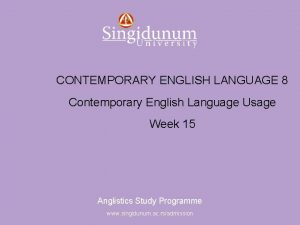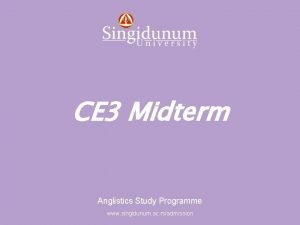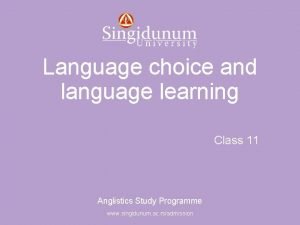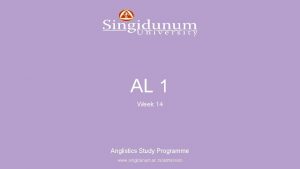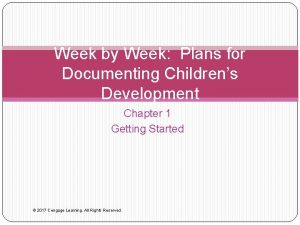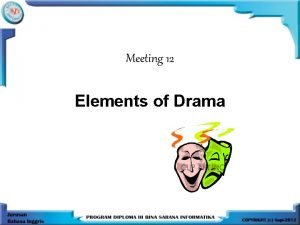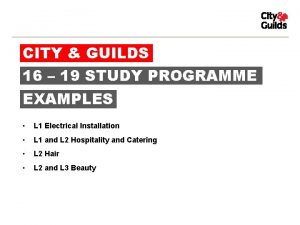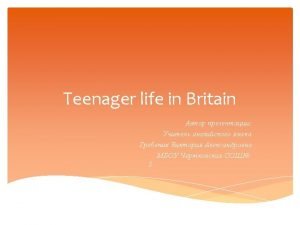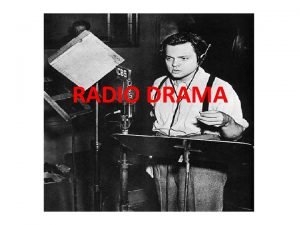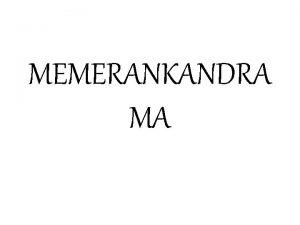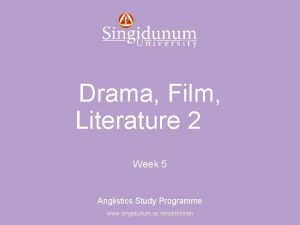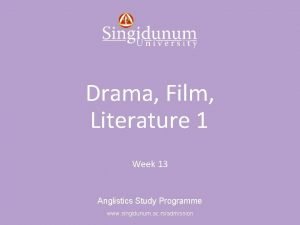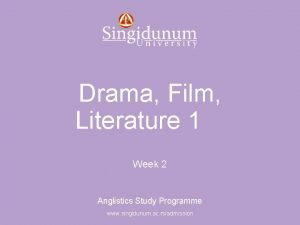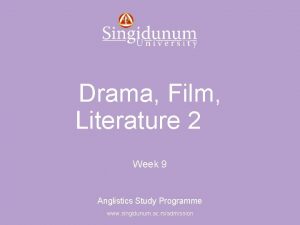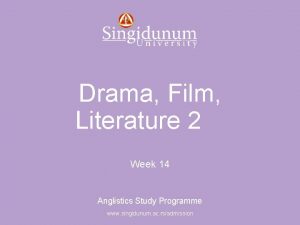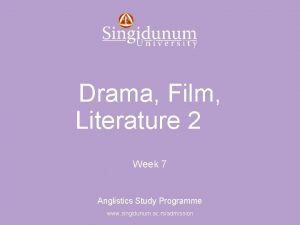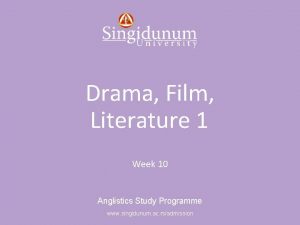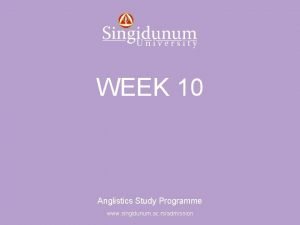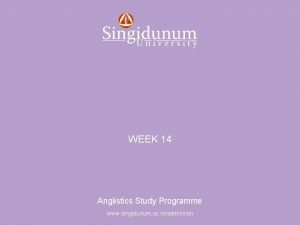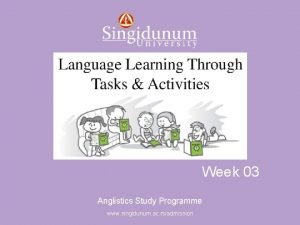Anglistics Study Programme Drama Film Literature 2 Week











- Slides: 11

Anglistics Study Programme Drama, Film, Literature 2 Week 8 Anglistics Study Programme www. singidunum. ac. rs/admission

Anglistics Study Programme William Shakespeare (1564 -1616) • Shakespeare was born and died in Stratford-upon-Avon, central England • He married Anne Hathaway and they had three children • There is no documentary evidence about his life for the period between 1585 and 1592, but some time during this period, he moved to London and began working in theatre as an actor and writer • Most of his work was produced between 1589 and 1603. • He had a playing company called the Lord Chamberlain’s Men which was later renamed to the King’s men.

Anglistics Study Programme ‘University Wits’ • Shakespeare’s predecessors (or even better Shakespeare’s early contemporaries) were known as ‘University Wits’, i. e. a group of graduates from Oxford and Cambridge with learning and talent, but no money. Given the fact that they could not find a secular employment, many turned to the most lucrative option of all – writing plays for the new popular theatre. • Young scholars of liberal education who belonged to this group were: George Chapman, John Lyly, George Peele, Robert Greene, Thomas Kyd, and Christopher Marlowe.

Anglistics Study Programme Christopher Marlowe (1564 -1593) • He was the greatest playwright until Shakespeare • Like all ‘University Wits’, he had a wild reputation (believed to be an atheist, consorted with thieves and ruffians, fought the police, etc. ) • Marlowe’s reputation as a dramatist rests on five plays: Tamburlaine, Doctor Faustus, The Jew of Malta, Edward II, and Dido, Queen of Carthage • He was the first true voice of the Renaissance – above all, his plays convey the spirit of human freedom, limitless human power and enterprise Tamburlaine – the great conqueror embodies tyrannical power Barbas, the Jew of Malta – stands for monetary power Faustus – the most deadly hunger of all – power given by supreme knowledge

Anglistics Study Programme Elizabethan Theatre • Most of theatre buildings of the period were open-air theatre because they took inspiration from Roman amphitheatres. • Audience - in the XVI – XVII centuries going to theatre was pure amusement. Everybody liked it, and poor people, too, went to see the most popular plays. The poor did not have a seat; they stood “on the ground” in front of the stage and for this reason they were called “groundlings”. All other classes attended theatre as well. Actors needed to establish intimate communications with the audience • Actors: in the Elizabethan Theatre women’s roles were played by young men or boys. Today at the Globe both men and women interpret Shakespearean characters, but some works are played by men only to recreate the real atmosphere of that period.

Anglistics Study Programme The Globe • It was built in 1599 by Shakespeare’s playing company called the Lord Chamberlain’s Men and was destroyed by fire in 1613. • After the accession of King James I, theatre was granted permission to change its name to the King’s Men. • The modern copy of the Globe was built in 1997. and it is located on a bank of the river Thames. • Stages in theatres of the period were equipped with mechanisms, a trapdoor, but there was very little scenery available for theatres, so writers often used dialogues to explain to the audience where the scene was taking place • Costume was rather important in Elizabethan theatre – costumes told the audience the characters status, family ties or profession. • The theme of disguise became a common convention of theatre due to the emphasis given to a character’s clothing. • Sound effects – music played an important role in setting the mood

Anglistics Study Programme Shakespeare’s language • Shakespeare wrote in Early Modern English, which is not that different from Modern English but for some holdovers. • Shakespeare coined many words we still use today: critical, majestic, dwindle, countless, obscene, etc. and quite a few phrases: flesh and blood, green-eyed monster, foul play, etc. and even some names that are still in use today: Imogen (Cymbaline), Jessica (The Merchant of Venice), Miranda (The Tempest), Olivia (The Twelfth Night), Cordelia (King Lear)

Anglistics Study Programme Drama • It is a form of literature which is also known as a play. • A serious type of play that concerns the character versus society. • It is intended to be played in front of the audience. • There are three important elements in drama: • story • performance • audience • Tragic hero – a character who experiences an inner struggle due to a character flaw and it ends in defeat for the hero.

Anglistics Study Programme Shakespeare’s plays • Shakespeare wrote 38 plays that have been firmly attributed to him. • His plays can be divided as follows: TRAGEDIES – a play in which the hero is destroyed by some character flaw and by forces beyond his control; they deal with ethical issues, i. e. human behaviour in border-line situations e. g. Hamlet, Macbeth, Romeo and Juliet, Othello, King Lear, etc. COMEDIES – a play of a light, amusing kind intended to make people smile; it ends in marriage; in comedy, human errors or problems may appear humorous, e. g. Midsummer’s Night Dream, As You Like It, Much Ado About Nothing, Merchant of Venice, etc. HISTORICAL PLAYS – about a historical event or character; usually deal with a situation in British society during the period from XII till XVI centuries, e. g. Richard III, Henry IV, Julius Caesar, etc. ROMANCES – a form of literature that presents life the way we would like it to be – great adventure, love, and excitement, e. g. Pericles, Winter’s Tale, Cymbeline, Tempest.

Anglistics Study Programme Shakespeare’s poems • Shakespeare has written 154 sonnets. • The Shakesperean or English Sonnet has 14 lines and is divided into three quartrains and a couplet. The rhyming scheme usually is abab, cdcd, efef, gg. • Most of his sonnets are about love, even though most of poetry of that time was usually dedicated to a patron • Shakespeare wrote two major poems, as well: Venus and Adonis, and The Rape of Lucrece.

Anglistics Study Programme Shakespeare today • Elizabethan theatre is still plays a part in our day to day lives, mostly through the influence of Shakespeare. You can find references to his work in films, novels, plays, musicals, songs, poetry, artwork, satire…Even today his characters and storylines continue to inspire… • Homework: think about and provide examples of Shakespeare being used in the popular culture that surrounds us.
